Guide to Software Outsourcing in 2025
Curious about how the outsourcing of software development can benefit your business? By outsourcing, you can tap into specialized talent, lower your costs, and speed up your projects. This guide covers the essentials to get you started.
Key Takeaways
-
Software outsourcing enables businesses to access global talent, enhance efficiency, and reduce operational costs.
-
Key benefits include cost efficiency, access to specialized skills, and the ability to focus on core business operations.
-
Challenges such as communication barriers, quality control, and project scope management must be addressed to ensure successful outsourcing.

Understanding Software Outsourcing
Software outsourcing is a powerful strategy where companies delegate software development and maintenance tasks to specialized third-party providers, including a software outsourcing company. This approach helps businesses enhance efficiency, reduce costs, and access expertise that may not be available in-house. Outsourcing software development helps companies accelerate their processes, resulting in quicker product launches and a competitive advantage.
The trend of outsourcing services is driven by various factors, including the need for IT modernization, the rise of remote work, and the desire to access global talent. This strategy enables organizations to streamline operations, scale efficiently, and concentrate on core business activities.
Whether locally or globally, software outsourcing opens up a world of opportunities for businesses looking to access global expertise, innovate, and grow.
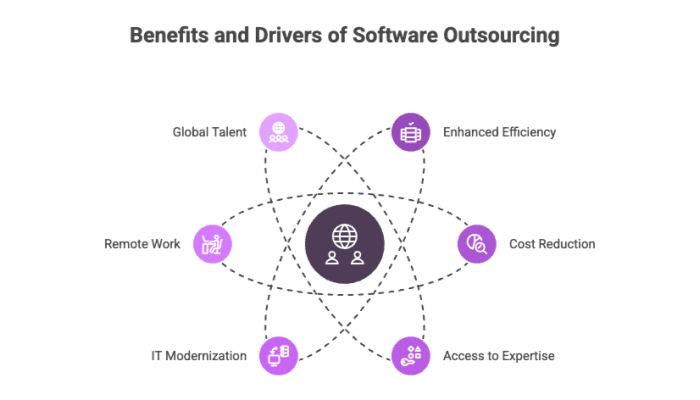

Key Benefits of Outsourcing Software Development
Outsourcing software development offers numerous benefits that make it an attractive option for businesses of all sizes. From accessing a diverse global talent pool to achieving significant cost savings and allowing companies to focus on their core operations, the advantages of outsource development are compelling.
These benefits warrant a closer examination.
Access to Global Talent Pools
One of the standout advantages of outsourcing software development is the ability to tap into a vast global talent pool. This is particularly beneficial for startups and companies seeking specialized skills that are not readily available domestically. Partnering with outsourcing providers gives businesses instant access to a variety of skilled professionals, bypassing the time and expense of recruitment.
Countries like Chile, Colombia, and Uruguay are notable for their high-quality IT talent pools:
-
Chile boasts a high human development index and strong technological talents.
-
Colombia’s thriving IT economy is supported by a young population and government incentives.
-
Uruguay is characterized by its strong educational system and high-quality IT talent.
These regions offer businesses the opportunity to engage top software engineers with extensive experience in specialized fields.
Cost Efficiency
Cost efficiency is a primary driver for outsourcing software development. Outsourcing allows companies to lower development costs by taking advantage of cheaper labor rates and other efficiencies in countries with lower salaries. For example, developers in India earn significantly less compared to their counterparts in the US, offering substantial cost savings.
Outsourcing also removes the financial burden of maintaining internal infrastructure. Operational costs are driven down because outsourcing allows for a more efficient use of resources and specialized expertise, optimizing project management overhead.
This financial efficiency makes outsourcing a strategic decision for businesses aiming to maximize their operational efficiency and achieve cost reduction.
Focus on Core Business Operations
Outsourcing enables companies to concentrate on their core business operations and strategic growth. Delegating software development to external teams frees up internal resources, allowing businesses to focus on essential functions and key product development. This shift allows management to reduce micromanagement efforts and utilize project managers effectively.
Outsourcing enables companies to channel their resources into strategic growth and essential operations, enhancing their outsourcing market readiness. This strategic focus on core activities ensures that businesses can concentrate on achieving their long-term goals.
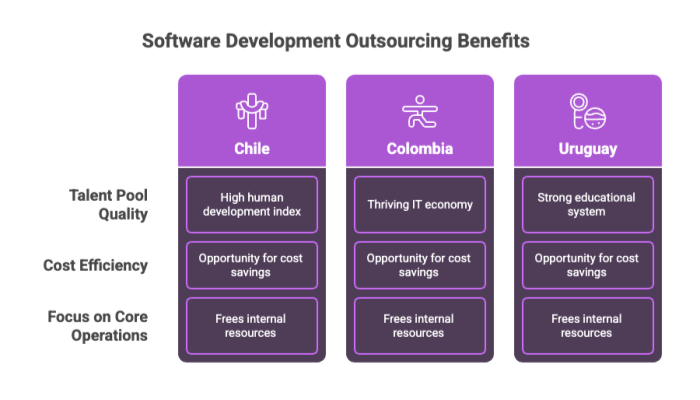

Common Challenges in Software Outsourcing
While the benefits of outsourcing are significant, it is not without its challenges. Effective communication, quality control, and project scope management are common hurdles that can impact the success of software development projects.
These challenges deserve a detailed examination.
Communication Barriers
Effective communication is crucial for the success of any outsourcing project. However, communication barriers such as language differences, cultural variations, and time zone differences can significantly affect the outcome of software development projects. Approximately 53% of companies report issues with effective communication when outsourcing.
Businesses can address these issues by:
-
Hiring bilingual professionals
-
Integrating external experts using staff augmentation
-
Implementing efficient communication strategies and tools to ensure clear and timely communication between in-house and outsourced teams.
Quality Control
Quality control is a critical aspect of software outsourcing. Ensuring that the final product meets the expected high-quality standards can be challenging if the vendor lacks a solid understanding of the project requirements. Inconsistent quality standards and weak project management can lead to delivery delays and discrepancies in output quality.
Mitigating these risks involves selecting an outsourcing partner with a strong track record and established quality assurance policies. Regular performance reviews and clear expectations help maintain alignment with project goals and uphold quality standards throughout the software development process.
Project Scope Management
Clearly defining the project scope is essential to avoid uncontrolled growth of tasks and unexpected budget increases during software development. Unclear project scopes can result in projects spiraling out of control with continuous additions and budget overruns.
Preventing these issues requires businesses to clearly define the project scope from the beginning. Regularly reassessing project goals ensures that they remain aligned with current business needs and market conditions.
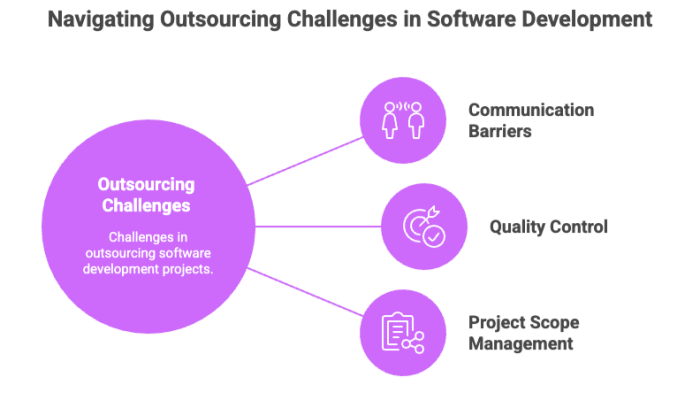

Popular Software Outsourcing Models
There are various software outsourcing models, including the nearshore outsourcing model, that businesses can choose from, each offering different benefits and considerations. Grasping these models is key to choosing the one that best fits your project needs and business goals.
Fixed-Price Model
The fixed-price model involves a contract where the cost is set in advance, providing financial predictability for projects with clear requirements. This model is ideal for projects with well-defined objectives and deliverables, ensuring cost efficiency and reducing financial risk.
Time and Materials Model
The time and materials model is a project management approach where:
-
Billing is based on the actual time spent on the project and the materials used.
-
Payments are calculated based on hourly rates for labor, plus the cost of materials and tools utilized in the project.
-
The model offers flexibility, allowing adjustments to the project scope and direction as needed without major contract changes.
However, this model can present challenges such as difficulty in budget estimation and the risk of scope creep, as ongoing changes may lead to increased costs and potential delays.
Dedicated Team Model
A dedicated team is formed to focus on a long-term project with client participation. These dedicated teams:
-
Work exclusively on a client’s project, ensuring alignment with business goals
-
Allow for long-term collaboration
-
Enable clients to scale the number of dedicated team members up or down as needed, providing flexibility and control over the development team process.
This model shares both advantages and disadvantages with staff augmentation, as it integrates closely with the client’s internal team in-house teams, fostering a cohesive working relationship.
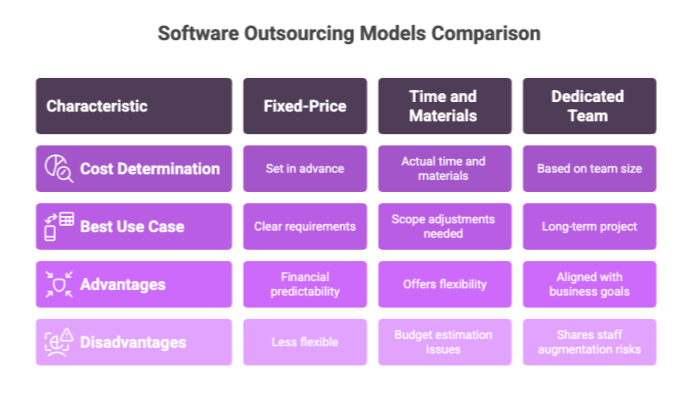

Steps to Successfully Outsource Software Development
Successfully outsourcing software development requires a business strategy that ensures business goals are met and the partner’s capabilities are utilized effectively.
Here are the essential steps to achieve successful outsourcing.
Define Project Goals and Requirements
The foundation of successful outsourcing starts with a practical project definition that outlines specific needs and expectations. Clearly defining the project’s scope, objectives, and deliverables is essential for avoiding misunderstandings and inefficiencies. A thorough project definition includes:
-
Objectives
-
Methods
-
Tools
-
Frameworks
-
Skills
-
Experience
-
Performance-based requirements.
Before outsourcing, businesses should evaluate their specific project requirements, necessary skills, and timeline. Providing clear guidance through explicit goals helps enhance team focus and drive project success.
Budget Estimation
Accurate budget estimation is crucial for the financial planning and success of outsourcing initiatives. When estimating the project budget, consider the number of professionals, their average rates, and the outsourcing company’s commission. It is also essential to account for potential hidden costs to provide a comprehensive view of project financials.
Effective budget estimation ensures that businesses can plan financially and allocate resources efficiently, ultimately leading to project success.
Selecting the Right Outsourcing Partner
Choosing the right outsourcing partner and outsourcing partners is essential for ensuring project success and aligning with business objectives. Evaluate potential partners based on their technical proficiency, industry expertise, and proven track record in similar projects. Consider security aspects such as adherence to international security standards and contractual agreements regarding IP protection with an appropriate outsourcing partner.
Criteria such as cultural fit, transparency, and communication practices should guide the selection process, ensuring a successful outsourcing partnership and fostering a strong company culture.
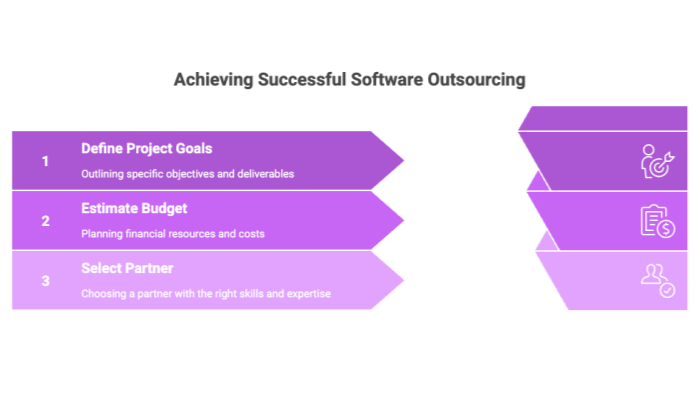

Best Practices for Managing Outsourced Software Development Teams
Managing outsourced software development teams effectively requires implementing best practices that enhance collaboration and ensure project success throughout the software development lifecycle using project management tools, an in house development team, and an outsourcing team for software testing in a software project.
Here are some key strategies.
Effective Communication Strategies
Effective communication promotes transparency and collaboration in software development outsourcing. Key elements include:
-
Utilizing tools like Slack and Zoom to enhance communication between in-house and outsourced teams, ensuring real-time collaboration and reducing misunderstandings.
-
Documented communication methods.
-
Efficient communication channels essential for maintaining clear and timely communication.
Setting Clear Milestones and Deadlines
Establishing clear milestones, deliverables, timelines, and regular check-ins is essential for keeping outsourcing projects on track. Common methodologies used in project management for outsourcing include Agile or Scrum, which enhance accountability and facilitate timely project delivery.
These project management practices collectively ensure that projects remain aligned with goals and progress is tracked effectively.
Regular Performance Reviews
Conducting regular performance reviews is essential for maintaining alignment with project goals and ensuring the quality of work. Regular feedback sessions can help identify strengths and areas for improvement, keeping teams motivated and focused on delivering high-quality results.
Assessing work quality and gathering feedback from in-house teams help ensure the outsourced team stays on track and meets expected standards. This proactive approach helps in addressing any issues promptly and maintaining the overall project trajectory.
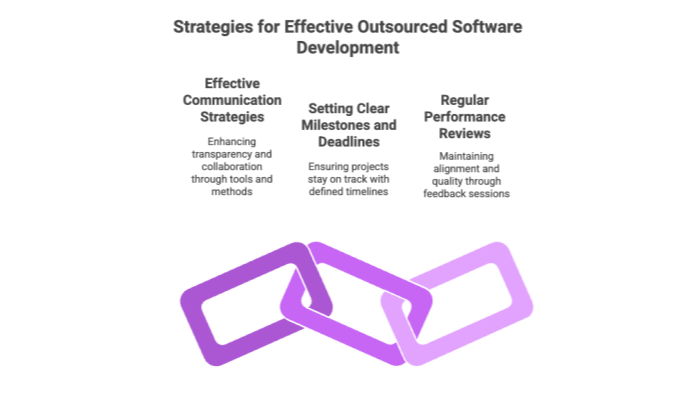

Top Destinations for Software Outsourcing
Selecting the right outsourcing destination is crucial for leveraging technical expertise and achieving cost-effective solutions. Various regions around the world have emerged as top destinations for software development outsourcing due to their skilled talent pools and competitive pricing.
Examining these key regions provides further insight.
Eastern Europe
Eastern Europe, particularly countries like Poland and Ukraine, has gained recognition for its strong coding skills and technical expertise. These countries offer numerous benefits, including access to skilled developers and cultural compatibility, making them attractive outsourcing destinations.
With a robust educational system and a growing number of tech professionals, Eastern Europe provides businesses with a reliable talent pool capable of handling complex software development projects.
Asia
Asia remains a popular outsourcing destination, with India leading the charge as the most sought-after location for software development. The estimated hourly rates for software development services in India range from $15 to $50, offering significant software development outsourcing cost savings for businesses.
China also presents attractive options, with product development costs for offshore developers typically between $35 to $60. The region boasts around 15 million software developers, providing a vast talent pool for businesses to leverage.
Latin America
Latin America is home to a diverse and skilled software development workforce, with countries like:
-
Brazil
-
Argentina
-
Mexico
-
Colombia
-
Costa Rica standing out for their capabilities. Brazilian developers, for instance, excel in:
-
data visualization
-
databases
-
computer programming
-
mobile development.
Mexican developers are highly desired by U.S. enterprises for their proficiency in computer and data science, and Mexico’s strong relations with the U.S. enhance its appeal as a nearshoring option.
The region’s commitment to advancing its tech industry, supported by government incentives and educational institutions, further strengthens its position as a top outsourcing destination.
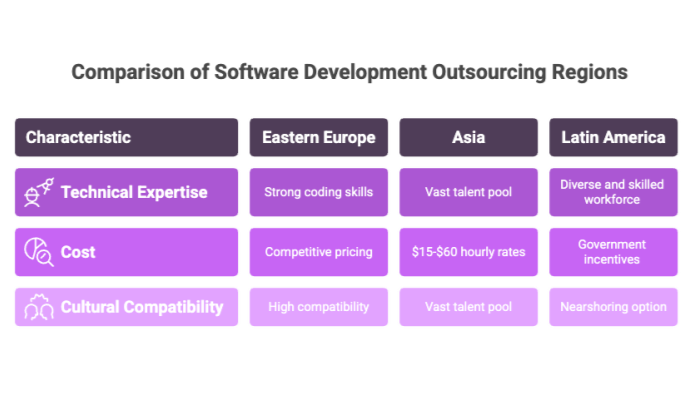

Protecting Intellectual Property in Software Outsourcing
Protecting intellectual property (IP) is critical when outsourcing software development. Legal protections include:
-
Patents
-
Copyrights
-
Trade secrets
-
Trademarks These help safeguard the rights to produce and sell inventions and specific software expressions. Clear licensing agreements outlining usage terms and penalties for unauthorized use reinforce these legal protections.
Implementing strong security measures, such as encryption and tamper detection, is crucial for protecting software IP post-deployment. Non-disclosure agreements (NDAs) and confidentiality agreements are essential for safeguarding sensitive information shared during development, particularly in the context of data security.
Regular security audits of software code can help identify vulnerabilities that could be exploited for IP theft. Collaboration with legal experts ensures that software IP rights are clearly defined and enforceable.
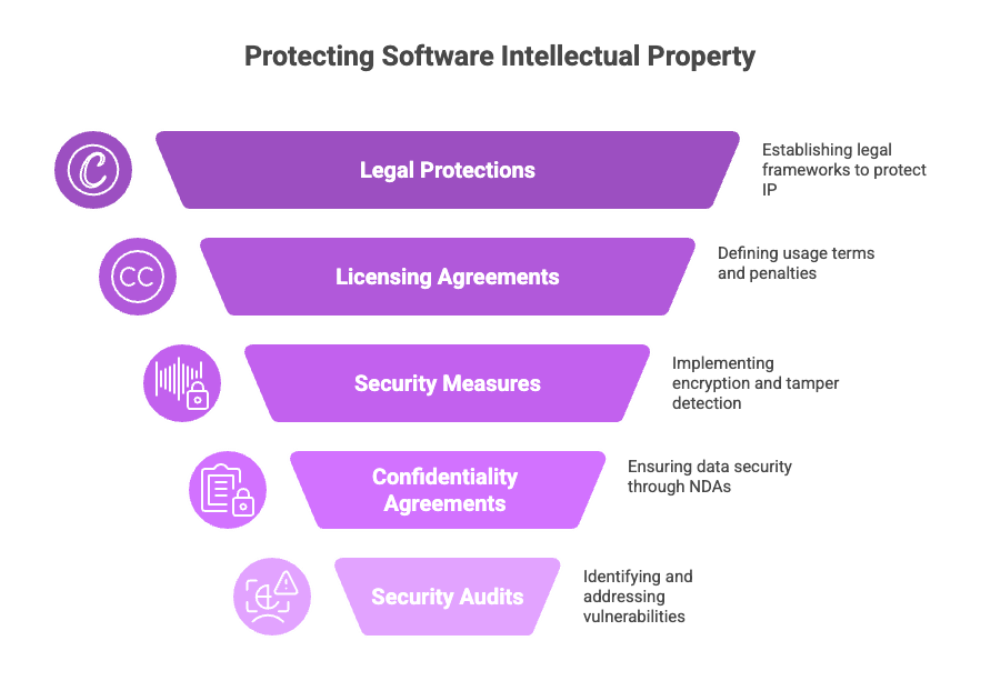

Case Studies of Successful Software Outsourcing
Real-world case studies offer valuable insights into the success of software outsourcing. For instance, Cognativ is renowned for its AI innovation, top-tier talent across the Americas, and alignment with client business goals, leading to quicker software delivery. Evaluating an outsourcing partner’s past performance through case studies can provide insights into their reliability, ensuring better decision-making.
Our company has successfully contributed to the growth of three unicorn companies while delivering over 170 projects across various industries. These examples highlight how outsourced development can significantly benefit tech startups by allowing them to quickly launch their products with expert support.
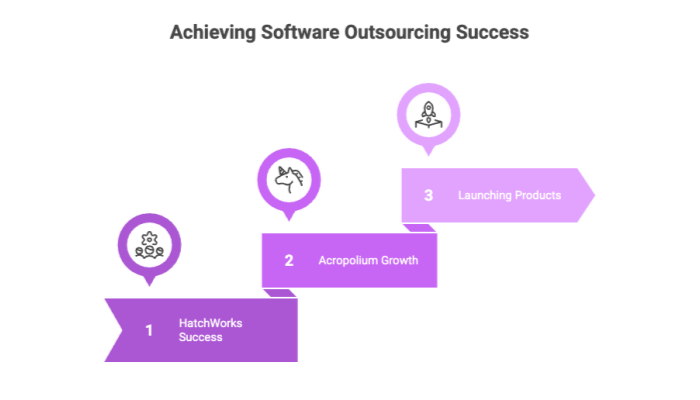

Future Trends in Software Outsourcing
Looking ahead, several trends are expected to shape the future of software outsourcing. Eastern Europe and Latin America are poised to see increased software development contracts due to their growing talent pools and competitive pricing. Hybrid work models, blending remote and on-site work, are becoming prevalent to improve flexibility in outsourcing.
Outsourcing firms are prioritizing enhanced collaboration tools to facilitate better communication among distributed teams and ensure alignment with project goals. Additionally, outsourcing companies are focusing on sustainability and ethical practices, with companies seeking partners that align with their values.
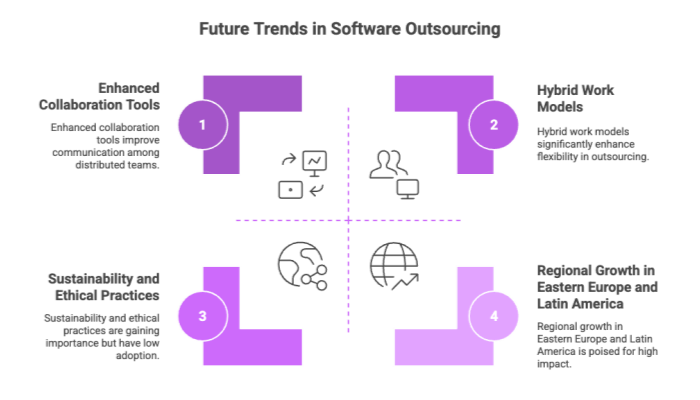

Summary
In summary, outsourcing software development offers numerous benefits, including access to global talent, cost efficiency, and a focus on core business operations. While challenges such as communication barriers and quality control exist, they can be mitigated with effective strategies and best practices. By understanding the different outsourcing models and selecting the right partner, businesses can achieve successful outsourcing outcomes. As the outsourcing landscape continues to evolve, staying informed about future trends will be crucial for maintaining a competitive edge.

Frequently Asked Questions
In today's fast-paced digital world, the outsourcing of software has become a strategic approach for businesses aiming to leverage custom software development and mobile app development without the burden of managing an entire development process internally. By partnering with a reliable software development company or service provider, organizations can efficiently delegate complex software development tasks, tap into specialized programming languages expertise, and incorporate advanced technologies like machine learning. This not only accelerates project delivery but also ensures access to a vast global talent pool, making outsourcing software development a cost-effective and scalable solution for modern business needs.
What are the main benefits of outsourcing software development?
Outsourcing software development provides access to a diverse global talent pool, enhances cost efficiency, and allows your business to concentrate on its core operations. These advantages can significantly improve overall productivity and innovation.
How can communication barriers be overcome in software outsourcing?
To effectively overcome communication barriers in software outsourcing, it is essential to employ bilingual professionals, utilize efficient communication tools, and integrate external professionals into existing teams. Implementing these strategies fosters better collaboration and understanding.
What are the popular software outsourcing models?
The popular software outsourcing models include the fixed-price model, time and materials model, and dedicated team model. Each offers distinct advantages depending on project requirements and client preferences.
How can intellectual property be protected in software outsourcing?
Intellectual property in software outsourcing can be effectively protected by implementing legal agreements, maintaining robust security measures, and conducting regular security audits in collaboration with legal experts. This approach ensures that your intellectual property rights are upheld and safeguarded throughout the outsourcing process.
What are some future trends in software outsourcing?
Future trends in software outsourcing will likely see a rise in contracts in Eastern Europe and Latin America, the adoption of hybrid work models, and a greater emphasis on sustainability and ethical practices. Enhanced collaboration tools will also play a crucial role in this evolving landscape.


